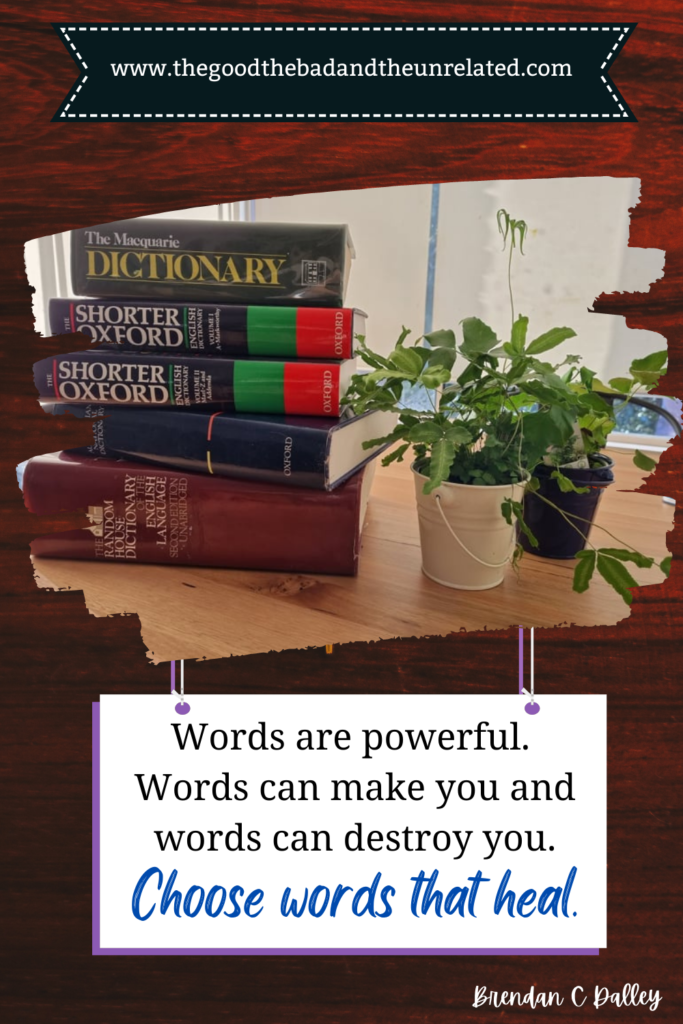NB: This blog discusses mental heath issues. I am a writer not a medical professional. Whilst words can heal, If this piece causes any concerns for you, please see a Doctor immediately. This is always the best thing to do.
Words are powerful. Words can make you and words can destroy you. If you live long enough, you will have experienced plenty of both. Bitter words in the school yard hurt just as much as bitter words in the Boardroom or even the bedroom. Similarly, healing words can save a life, and if like me you believe, Jesus’ words can even lead to salvation. As we grow, generally we get better at delivering words when they will have the greatest effect, but we can always get better at it. We can learn to use words so that our words can heal.
I have often been someone who would throw words at a problem like a boxer throws punches. I would keep talking till the problem, whatever it was, went away. The problem with this approach was that some of what I said was misguided and would hurt. My friend Greg chooses his words much more wisely and over the years, thankfully, I have learnt a little of this skill from him. Still, words can be dangerous.
A moment when time stood still
Only a few years ago, I had an experience where the words of a song summed up exactly how I felt. They cut through all my confusion and broke me in two. For someone who has made a living either teaching words or writing words, you’d think I was prepared for it, but I wasn’t.
Without going into any detail, I had been struggling with some recent work related trauma. The apple cart that was my brain, had been significantly upset, and I was only just beginning to realise how much.
After dropping my child at an event one evening, I was driving home alone and flicking through radio channels, when I heard Neil Diamond’s song I am, I said. Being a person of a suitable age, I had heard this song many times before and even knew the words. The only difference about this time was that the words spoke directly to me in a way they had never done before..
If you know the words then sing along. The particular verse I refer to goes:
“Did you ever read about a frog who dreamt of being a king, and then became one? Well except for the names and a few other changes, if you talk about me, the story’s the same one… But I’ve got an emptiness deep inside and I’ve tried but it wont let me go. Now I’m not a man who likes to swear, but I’ve never cared for the sound of being alone…I am, I said to no one there and no one heard at all, not even the chair.”
An emptiness deep inside
As the words about having an emptiness deep inside that won’t let you go, rang out, I inexplicably started to cry. Such was the pain that I had to pull over and compose myself. The sight of a rather large gentleman, driving a late model sedan whilst wailing, is not a pretty or common sight in my country, so this was for the best. In hindsight, I had suddenly realised that all I had done to let go of the emptiness had been for nought and I needed help, but that became clearer later on.
Aware that something emotional had snapped inside me, much like a cruciate ligament feels when you twist your knee, I had to take stock. Knowing though, that my family was expecting me home, I quickly tidied myself up and put the experience to the back of my mind, knowing something significant had changed.
Like all significant events, this one would not be ignored. With the help of my wife, the next day I found myself in a Doctor’s office, finally being diagnosed with Major Depression and Post Traumatic Stress Disorder (PTSD). This is not an autobiography, suffice to say that this long winded story illustrates that sometimes someone else’s words can trigger something that you cannot.
Choose your words wisely
With this in mind, I was considering some of the well worn phrases that we fall back on in difficult or emotional circumstances to support someone. People, with all the best intentions in the world, will say things like ‘I’m there for you’, ‘I feel your pain’, ‘let it all out’ and ‘I’ve got your back’. Whilst no one can actually ‘feel your pain’, what they are really saying is that they care about you and they understand. Still, these words are not always helpful.
I am reminded of a Robin Williams story from when his wife was giving birth to their first child. With all the compassion he could muster, Robin said something like “I’m here for you, Love. I can feel your pain.”
Robin’s wife apparently replied “Robin, unless you pass a bowling ball through the eye of your penis, you don’t feel anything”. The humourous point is clear. Sometimes it is best to just shut up and be there. If you must speak, be gentle and understanding, but be practical as well.
Reassure, listen, respond.
The day after my roadside breakdown example, when I attempted to explain to my wife that I could no longer go on feeling like I did, she responded in a very healthy manner. Initially, she just listened. Then she reassured me that it was okay and that she would not stop loving me if I had depression. Then she admitted that she didn’t know what to do and encouraged me to do something practical about it. If the truth be told, she actually made sure this happened by making a Doctor’s appointment for me.
My wife is not a trained counselor and neither am I, but in my view, she responded in a very powerful way. Firstly she comforted me with reassurance that she was in my corner. Secondly she listened and reaffirmed her love. Finally she offered practical advice and made sure it happened. Her words were well chosen, led to action and set me on the path to healing. She understood that words can heal.
Two keys to choosing healing words
If you are blessed enough in your life to have a relationship that is valuable, open and honest, then chances are that at some point they will come to you for emotional help. Not because you are an expert or because you are a genius, but because they love and trust you. The key here then is to listen. Don’t immediately regale them with stories about your own suffering. Rather, ask some clarification questions if you need to, but let them talk.
The second key to healing words is that whenever it is appropriate for you to respond, let your guiding light be that of kindness. You don’t need to chastise them at this point, nor point out their failings. This is the job of a professional. Rather, what you need to be is a conduit to a healthier place. This means reassure…listen…respond honestly. You don’t have to have all the answers, but you do need to be willing to hold their metaphorical hand to help guide them to the right answers. If you do this with gentleness and kindness, your words will never hurt… At least not intentionally.
There are a number of organisations that offer free advice on how to respond to someone in crisis. If you want to be prepared so that your words can heal, follow the links below and remember them.
Links
Blog » The Good The Bad and The Unrelated
Mental health resources and tools – Black Dog Institute
A conversation could change a life | R U OK?
Neil Diamond – I am… I said (W/Lyrics) – YouTube



Great blog post! Very helpful!
Thankyou kindly.
Nice Buddy. You must be older though. I don’t know that Neil Diamond song 🤣
Thanks buddy. I probably heard it 20 days before you were born haha.
Love this post! Thank you so much for sharing. PS-I am a big Neil Diamond fan 🙂
Thanks Shelley, You are very kind. Neil Diamond has some brilliant songs.
When you have the choice choose kindness. Yup.
It is so rare these days, but so important.
Love this! Thank you for sharing.
Thanks for your kind words.
Pingback: What not to say to someone in crisis » The Good The Bad and The Unrelated